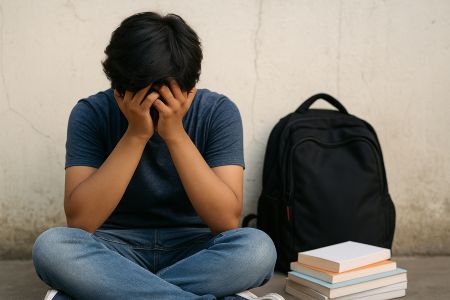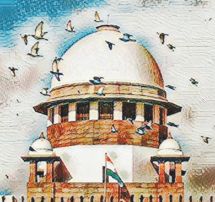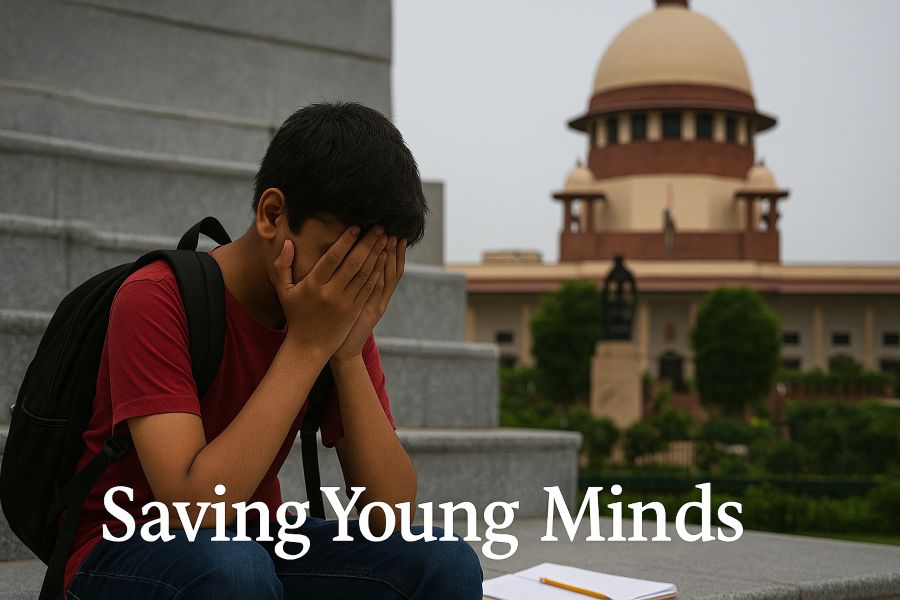Supreme Court issues 15-point guidelines to protect young lives as exam stress and societal pressure continue to claim students across India.
WITH THE ACUTE pressure of parental expectations and intense scrutiny by society, incidents of student suicides have been increasing sharply in the country. There are frequent media reports of students—sometimes even school children and those appearing for competitive examinations—attempting or committing suicide.
This worrisome trend reflects the poor attention paid to the mental health of students by the government, educational institutions, and coaching centres. The weight of parental expectations and the societal fear of failure can push students to mental breaking points, often with devastating consequences.

This distressing reality is reflected in the National Crime Records Bureau (NCRB) data for 2022, the latest such data released. It pointed out that of the 1.80 lakh cases of suicide reported that year, 13,044 were students, with 2,248 linked to examination failures. This marked a significant rise from 5,425 student suicides in 2001.
Data analysed by a voluntary organisation showed that while overall suicide numbers increased by 2 per cent annually, student suicide cases surged by 4 per cent. Yet, the actual numbers may be much higher, given the tendency to underreport suicides due to societal stigma.
Various governments have taken some half-hearted measures to curb this tendency, but the efforts are far from adequate. For instance, the Rajasthan government issued guidelines for coaching academies in the state, particularly in Kota, where 15 to 20 students have been committing suicide annually.
The central government, too, introduced guidelines for the prevention of student suicides in schools under the programme *UMMEED*. These include chapters on identifying suicidal tendencies and preventing attempts. However, little attention has been paid to the implementation of such guidelines.
 Taking serious note of the sharply rising number of student suicides, the Supreme Court has issued landmark 15-point guidelines for educational institutions and coaching academies and has asked the government to enact legislation to ensure effective steps are taken to save precious lives.
Taking serious note of the sharply rising number of student suicides, the Supreme Court has issued landmark 15-point guidelines for educational institutions and coaching academies and has asked the government to enact legislation to ensure effective steps are taken to save precious lives.
While adjudicating a specific case of a 17-year-old student’s unnatural death in Visakhapatnam, a division bench of Justice Vikram Nath and Justice Sandeep Mehta issued comprehensive interim guidelines to safeguard the mental health of students across educational institutions.
The bench observed that there was a “legislative and regulatory vacuum” in the country with respect to a “unified, enforceable framework for suicide prevention in educational institutions, coaching centres, and student-centric environments.”
It added: “The continued loss of young lives, often due to preventable causes rooted in unattended psychological distress, academic overburden, social stigma, and institutional insensitivity, reflects a systemic failure that cannot be ignored.”
 The bench noted that these measures would remain in force and be binding until appropriate legislation or regulatory frameworks are enacted by the competent authority.
The bench noted that these measures would remain in force and be binding until appropriate legislation or regulatory frameworks are enacted by the competent authority.
The judges said that all educational institutions with 100 or more enrolled students should appoint or engage at least one qualified counsellor, psychologist, or social worker with demonstrated expertise in child and adolescent mental health. “Institutions with fewer students shall establish formal referral linkages with external mental health professionals.”
The guidelines also include a provision that all residential institutions must install tamper-proof ceiling fans or equivalent safety devices and restrict access to rooftops, balconies, and other high-risk areas to deter impulsive acts of self-harm. Among other directives, institutions have been asked to create an effective grievance redressal mechanism and to refrain from segregating students into batches based on academic performance.
 The court remarked that education has now been reduced to a “high-stakes race,” where students face relentless performance metrics, societal expectations, and institutional rigidity, often at the cost of their mental well-being. “In this paradigm, life becomes a series of tests, and failure is seen not as a part of growth but as a devastating end,” the bench added.
The court remarked that education has now been reduced to a “high-stakes race,” where students face relentless performance metrics, societal expectations, and institutional rigidity, often at the cost of their mental well-being. “In this paradigm, life becomes a series of tests, and failure is seen not as a part of growth but as a devastating end,” the bench added.
While the guidelines are laudable, India’s education sector is vast and diverse, making their implementation a Herculean task. Another challenge is the acute shortage of qualified psychologists and counsellors in the country.
India has only 0.3 psychiatrists per one lakh people, according to WHO estimates, whereas most families in Western countries have access to family counsellors. In addition, the stigma associated with mental health in India remains a deterrent.
The success of these guidelines will ultimately depend on robust enforcement, adequate funding, and widespread public awareness campaigns. ![]()
________
Also Read:
Sindoor Scattered: Rahul’s Raga of Resistance
Disclaimer : PunjabTodayNews.com and other platforms of the Punjab Today group strive to include views and opinions from across the entire spectrum, but by no means do we agree with everything we publish. Our efforts and editorial choices consistently underscore our authors’ right to the freedom of speech. However, it should be clear to all readers that individual authors are responsible for the information, ideas or opinions in their articles, and very often, these do not reflect the views of PunjabTodayNews.com or other platforms of the group. Punjab Today does not assume any responsibility or liability for the views of authors whose work appears here.
Punjab Today believes in serious, engaging, narrative journalism at a time when mainstream media houses seem to have given up on long-form writing and news television has blurred or altogether erased the lines between news and slapstick entertainment. We at Punjab Today believe that readers such as yourself appreciate cerebral journalism, and would like you to hold us against the best international industry standards. Brickbats are welcome even more than bouquets, though an occasional pat on the back is always encouraging. Good journalism can be a lifeline in these uncertain times worldwide. You can support us in myriad ways. To begin with, by spreading word about us and forwarding this reportage. Stay engaged.
— Team PT

